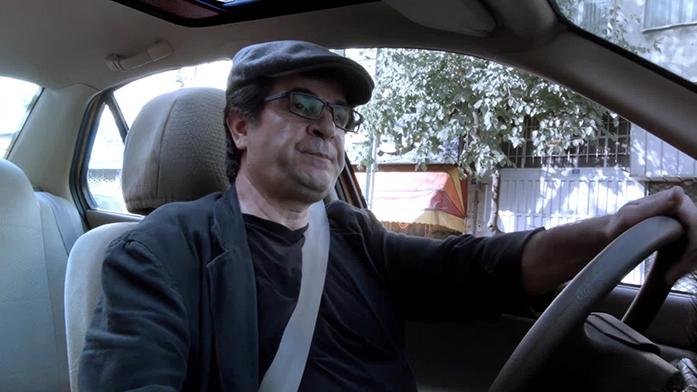By Girindra Selleck
Iranian director Jafar Panahi’s latest work, Taxi, is a deeply dialectical affair. Since winning the Caméra d’Or at the Cannes Film Festival in 1995 for The White Balloon (marking the first time in history an Iranian director won the award), Panahi has had a long and fruitful career writing and directing films such as The Circle, The Mirror, and Offside.
However, there is a darker side to Panahi’s success. In 2010, Panahi was arrested and charged with creating propaganda against the Iranian government and was sentenced to six years in prison. Along with the prison sentence, Panahi was given a 20-year ban from making films. Since the ban was enacted, Panahi has released three new films and written the screenplay for a fourth.
His new film — part mockumentary, part stream-of-consciousness autofiction — follows Panahi as he drives a taxi through Iran’s capital city of Tehran, picking up passengers and recording the conversations along the way. For those 81 minutes, we are not only in the taxi with Panahi and his passengers, we, like the passengers who drift in and out of Panahi’s taxi, are compelled to formulate our own opinions of the state of the city and of the many laws that both define and confine its citizens.
The film’s highly political tone is set by the first two passengers, a man and a woman, whose conversation quickly turns into a debate of whether stealing tires off a car merits the death sentence. The man — whose cousin was a victim of this particular crime — believes Sharia law must hold the thief accountable and punish him for his actions. The woman calls into question Sharia as a whole and accuses the man of too frivolously applying the death sentence. “So Sharia solves all our problems by increasing the number of executions?” she said and continued with as blatant a political commentary as, “After China, we [Iran] have the most executions.”
Some of the situations in the taxi take a more dramatic route to convey their message. For example, a man who had just been in a violent bicycle accident comes in with a large gash on his forehead and hopelessly begs for a pen and some paper to write out his will. His wife is with him and, in a state of utter panic, he wails that she will never get any of his property (“a few turkeys at best”) because Iran’s marriage laws don’t include any sort of inheritance clause for the wife in the case of the husband’s death. As a result, he must formally decree her as the beneficiary in his will or else she will be left homeless and penniless.
While upon close examination, it becomes clear the passengers of Panahi’s taxi are indeed actors, which is not immediately apparent. Panahi manages to blur the line between documentary and drama, and, in doing so, jolts the audience into realizing that, while the representations are fictional, the issues at hand are very real.
These examples, and others throughout the film, serve as commentary on the injustices occurring in Iran today. All the while in the back of the audience’s mind is a subtle awareness that even the very film they are watching is technically the work of someone Iranian leaders deems a “criminal.” While a government wrought with corruption goes unchecked, it is instead one man’s fight for the freedom of expression that winds up being the criminal act.
Through the use of his (literally) in-your-face dashboard camera, and the immersive effect it produces, Panahi forces us to experience these laws and injustices firsthand.
The film’s production and distribution is still shrouded in mystery. We don’t know how Panahi, who is still technically serving his prison sentence, managed to roam freely the streets of Tehran and then distribute this film. (In the past, Panahi has employed as clever a tactic as baking a USB drive into a cake and then shipping it out of Iran to ensure his films were seen.)
Taxi is the latest work of a man who refuses to let his government silence him, and with this film, we are placed right alongside him on his journey through an Iran hell-bent on doing just that.



